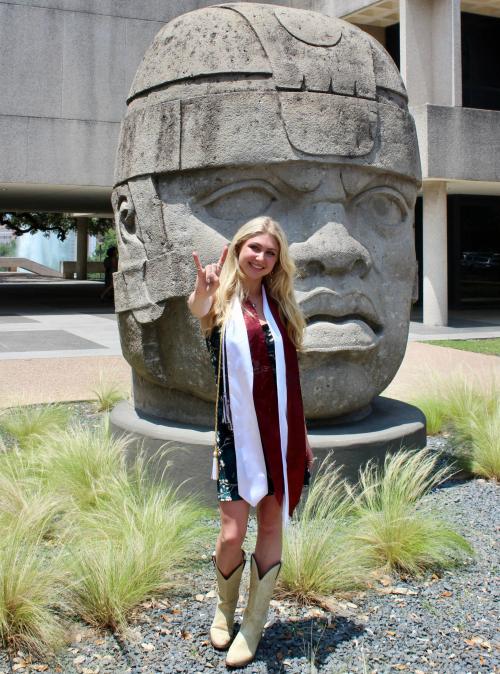Mayan Language Institute: Natalie Bruno Student Profile
Interview by Sydney Humphrey
Natalie Bruno is a second-year PhD student at Vanderbilt University in the department of Anthropology. Her work focuses on Preclassic Maya archaeology and linguistic anthropology in the Maya area. She is originally from New Jersey, and completed her undergraduate degrees at the University of Texas at Austin. She began her research in Guatemala through UT Austin and continues to work in the Maya area through Vanderbilt. Natalie began studying K’iche’ last fall through Vanderbilt to develop her research goals alongside the interests of the communities in her area of study. She is now continuing her study at the Mayan Language Institute in Quetzaltenango, Guatemala. Natalie looks forward to applying the nuanced cultural and linguistic knowledge she has gained from the K’iche’ teachers to form research questions that are more helpful and relevant to the K’iche’ community during her dissertation research and future career in academia. In her free time, Natalie enjoys yoga, running, visiting museums, reading, and spending time with friends.

Why did you decide to participate in the Mayan Language Institute?
I decided to attend the Mayan Language Institute because studying K’iche’ within its cultural context under the instruction of indigenous scholars seemed like the best way to learn the language. Additionally, I was already familiar with Tulane’s work through the Middle American Research Institute and was excited to pursue new connections within my field.
What have you learned from this experience that was unexpected?
I didn’t expect the program to be as social and involved as it is! All of the students have been very enthusiastic about learning K’iche’, but also about exploring the city and building relationships with the teachers and other students.
Do you think the Mayan Language Institute will have an impact on your future? How?
Definitely. First, thanks to the many excursions we have taken during the program, I have more experiences in different areas of the country and have a better understanding of who lives where and what different towns are like, which will be helpful for my future research. I plan to continue studying K’iche’, and this program has improved my language skills through extensive contact with the language and culture. Additionally, the program has provided me with access to additional resources that I will continue to benefit from. It has expanded my academic network by connecting me to many other K’iche’ students and scholars.
Share with us an anecdote from these past weeks/days. It can be something that condensed the learning experience, or a memorable experience you had with your peers, professors or the community.
I really enjoyed one of the first speakers of the summer that taught us about the process of planting ixim (corn) in the ab’ix (milpa). It was a fantastic experience to hear someone using K’iche’ to speak about their work and life in a practical way, while also highlighting connections to their spiritual significance within Mayan culture. The presentation taught me culturally specific vocabulary by using them within an original context. The speaker also gave us each dried seeds to hold while he explained their use and significance. It was a really significant and productive learning experience.
The Mayan Language Institute is a 6-week program to train students in either Kaqchikel or K’iche’ Maya, two of the most widely-spoken Mayan languages in Iximulew (Guatemala) today. The program is sponsored by the Stone Center for Latin American Studies at Tulane University and the Center for Latin American, Caribbean, and Latinx Studies at Vanderbilt University. Thanks to the collaboration between U.S. American faculty and Maya teachers, participants can study at the beginning, intermediate, or advanced levels of either language. The program’s highly individualized classes combine language immersion activities, lectures, one-on-one conversations, guest speakers and cultural excursions. If you are interested in learning more about the Mayan Language Institute or other Summer Programs click here.
